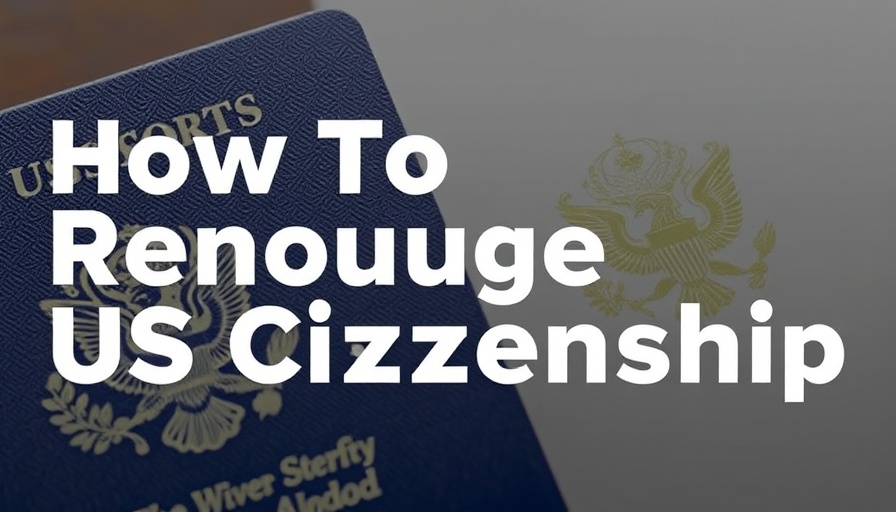
Understanding the Implications of Renouncing US Citizenship
Renouncing one’s US citizenship is not just an administrative process; it profoundly affects an individual’s life, creating waves of change that ripple through personal, financial, and relocational waters. This decision is often considered by expatriates who feel the burden of strict tax mandates from the US, which requires its citizens to report and pay taxes on their global income, regardless of their current residency. For many retiring individuals, digital nomads, or anyone seeking freedom from stringent regulations, this could appear as an attractive option.
The Renunciation Process: A Step-By-Step Guide
The path to renouncing US citizenship, while straightforward, requires attention to detail. Here’s a simplified overview:
- Appointment at Embassy/Consulate: An appointment must be arranged at a US embassy or consulate, which can be done online.
- Filling Out Form DS-4079: This form, crucial for the procedure, indicates your intention and is required for processing.
- Renunciation Fee: A substantial fee of $2,350 must be paid at the time of application.
- Attending a Ceremony: During a ceremony, you'll take an oath of renunciation and sign relevant documents, marking the official end of your citizenship.
- Receiving Your Certificate: A Certificate of Loss of Nationality will be issued, cementing your new status.
Eligibility criteria are equally essential: candidates must be 18 years or older and cannot have tax debts or criminal indictments.
Pros: Why People Are Making This Choice
The appeal for many in renouncing citizenship lies in the benefits that come with it:
- Tax Freedom: Individuals no longer remain liable for paying US taxes on their worldwide income, which can lead to significant financial savings.
- Less Paperwork: The headaches associated with filing US tax returns cease altogether.
- Legal Independence: Once renounced, you are not subject to US laws or military obligations.
Cons: The Reversal of Rights and Privileges
However, the decision comes with notable sacrifices:
- Voting Rights: By renouncing, you lose the fundamental right to vote in US elections.
- Loss of Residency: Ex-citizens cannot live or work in the US without special visas.
- Consular Assistance: You lose the advantages of US consular support when traveling abroad.
- Family Legacy: US citizenship cannot be easily passed down to descendants.
Common Misconceptions Surrounding Citizenship Renunciation
There are several misconceptions regarding renouncing US citizenship. One of the most prevalent is that it is solely a move for the wealthy or those with substantial tax burdens. In reality, individuals from various backgrounds are increasingly reconsidering their citizenship status as part of a broader search for personal and financial freedom. Moreover, not all expatriates fit a particular profile; many are middle-income individuals seeking a balanced lifestyle away from American tax obligations.
Emotional Factors and Personal Anecdotes
For many, the decision to renounce citizenship is deeply emotional, tied to identity and belonging. Consider Susan, a retired teacher who had built her life in Costa Rica. Faced with the relentless complexities of US taxes, she reflected on her life’s journey and ultimately chose to relinquish her citizenship. Her story reflects a growing sentiment among retirees, aligning one’s external realities with internal truths, leading to greater peace of mind.
Future Predictions: The Evolving Landscape of Citizenship
As globalization continues to reshape society, the implications of renouncing US citizenship may evolve. More individuals may consider this route to align with international lifestyles, resulting in shifts in US foreign policy as fewer citizens become available for tax obligations. It raises a significant question: how will these shifts impact not merely the economic landscape but also the personal identities of future generations?
Final Thoughts: Is Renouncing Right for You?
Ultimately, the decision to renounce US citizenship is profoundly personal, carrying significant advantages and disadvantages. Understanding the implications—financially, legally, and emotionally—is crucial before acting. Seek advice, engage in thorough research, and reflect on your motivations. Because this is not merely a bureaucratic process; it is a transformative life decision.
In conclusion, while renouncing citizenship may sound appealing due to tax benefits or legal restrictions, it's vital to weigh this against the personal sacrifices it entails. If you're considering this leap, gather all information and perhaps consult a financial advisor to evaluate whether the pros outweigh the cons for your unique situation.
 Add Row
Add Row  Add
Add 




 Add Row
Add Row  Add
Add 

Write A Comment